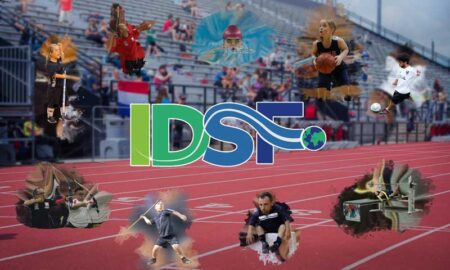World Dwarf Games, Michigan 2013
The sixth World Dwarf Games took place in the US state of Michigan from 3rd August to the 10th August 2013 and with over 400 athletes from 20 nations competing, was the largest sporting event in history exclusively for athletes with dwarfism.
People of restricted growth are not all of the same height or physical ability and so, as in the Paralympics, athletes are classified in terms of height and functional ability. At the 2013 world games you could see, or compete in,13 events.
One of the favourites being the physically demanding basketball. It’s played at a furious pace and the hoop remains – challengingly – at the standard height. Team GB had spent the last nine months training and learning the predominantly USA based sport. They had learned the strategy and worked hard to prepare three open age group mixed teams and one junior team. Every player proved their worth as all day long all three teams ran the ball and made scoring opportunities.
One of the GB mixed open teams made the semi finals but unfortunately finished outside the medals.
The juniors faired a little better winning the bronze medal in the 12 to 15 years age group. The rest of the world had to admit the most improved country was Great Britain, they also had to comment on how well turned out the GB team were in their white custom made kit, roll on 2017.
The quality of the track and field event was a sight to see, the 100 metre sprint event had over 60 entries and multiple heats, with the USA and Australian teams dominating in the 60m & 100m sprint events. Team GB did a little better in the relays and 200m event, but the field events are where team GB excels and the team had a great field event winning medals of all colours in multiple age groups throughout the day. If there is one area of dwarf sports that has risen in its profile since 2009 its swimming and the pool at the world games showed this increase in interest with close to 90 races held. In front of a packed audience there were many close run races, the USA, Australian, Irish and Great Britain teams often locked in titanic battles in the pool, culminating in the relay races over 100 and 200 metres. The second heat in the juniors 4x25m race being a particularly exciting race as the Team GB third leg swimmer went in last and cheered on by an ecstatic crowd touched first. Team GB went on to win 1 gold, 1 silver & 1 bronze in the relays, an outstanding achievement.
Another popular sport is Boccia, with a huge entry of players from all over the world it was both very skilled and strategic in its play. Players needed good hand to eye coordination and with a game strategy on a par with chess, the players have to concentrate at all times during play. With over 100 people entered into this sport there were many hours of play required before the winners were decided upon. Team GB had a difficult Boccia tournament in 2009 and were determined to make amends in 2013 and they did, winning a total of 12 medals overall in three different age groups. Well worth all the hours of training at Hamstead Hall Sports College in Birmingham, over 6,000 miles away from the final action at Michigan State University (MSU).
The first competitive games for athletes with dwarfism started right here at the Michigan State University campus in 1985. Back then it was as part of a wider disability games for those with cerebral palsy and those known as “les autres” a category in disability sport for athletes who didn’t fit the more established classification groups. Things have moved on a long way since then.
The International Dwarf Athletic Federation was created in 1993 and dwarf athletes are now an established part of the Paralympics. This has helped create nationwide stars like Great Britain’s gold medal -winning swimmer Ellie Simmonds. A fantastic sight to see was so many young athletes with dwarfism competing in the World Dwarf Games. The young athletes role models are world famous dwarf athletes such as Ellie Simmonds, Erin Popovich and Scott Danberg and their hero’s sporting achievements drive the young competitors to train and aim for even higher levels for futures games. At the opening ceremony it was remarked that the next generation of people with dwarfism will take it for granted that they can play sport and they will find a place to compete, such an important part of the legacy that the founders of dwarf sports have given to the dwarf community of the world.
The primary purpose of the world games is about sporting competition on a level playing field. But there’s no doubt there are powerful secondary benefits. Apart from keeping people fit, when the tracksuit comes off there’s a chance to meet, socialise and just “be”. The games bring huge benefits in self confidence and empowerment for individual athletes plus positive press that educates the average height world on the amazing sporting achievements of all the athletes taking part. An athlete was heard to say “It’s great to speak with others at the same eye level, people whom you can naturally pat on the back in sympathy or throw your arms around in celebration. Not having to explain anything, nor have strangers stare at you, is like having a week off from my real life.”
It’s not all fluffy warm stuff though. There is serious competition. There are hundreds of dedicated athletes who train very hard, make sacrifices, have to find sponsorship money, and travel great distances to get the chance to compete amongst their peers. Many athletes compete in multiple events over the week and the level of fitness needed to sustain this level of competition is super human.
Football, or soccer as it’s called in the USA, is perhaps the most keenly contested and talked about event at the games. Team GB were the current world champs – they won gold at the last Games in Belfast 2009. Team USA, not to mention Team Australia and Team Europe, wanted that to change. Different height, yes, but football rivalries are just as strong. In one football match earlier in the week, two players collided when going for the ball. One of them was knocked off his feet, before he hit the ground the opposing player stretched out his arm and caught him. It was unusual behaviour to see in competitive sport and it felt like it really was the taking part among equals that was important while still enjoying a very competitive tournament.
For the second time at a world games ladies soccer was featured with teams from Great Britain and the USA entered. After nail biting group stages, a final of the GB Belle’s team Vs the USA team was played on MSU’s newly restored and immaculate DeMartin field pitch and stadium, a part of this universities great sporting heritage. After a physical and demanding match the score was even and the gold medal would be decided on a penalty shootout. In front of a partisan audience split between home and away supporters, (the rest of the world led by Australia supporting the old country) the crowd roared and sighed in equal measure. All square after the first five it went to a nail biting sudden death with team GB ladies team “the Belle’s” finally triumphing over USA 6 – 5. The GB manager and coach almost had a heart attack while watching the team and especially the goalie go through the extreme stresses of deciding such an important game on penalties.
The junior final was also a USA Vs GB clash, the game was another heart stopper with quality players on both teams and finishing after 50 minutes of tension with a final score line of 3 – 1 to Great Britain. The open team final was set to be a titanic battle between once again the USA team and the Great Britain “Lions”. The USA were unfortunately the better side on the night looking just a bit fitter after the earlier rounds. More in control of their game they won with a final score of 4 – 2.
Just four years for team GB to prepare for the rematch. With thirteen sports on offer over seven days there is just too much to tell and there are many inspiring stories from every event, suffice it to say that the games were amazing and with every athlete of every age giving their best in every event on every day. No more could be asked.
It would be good to close with a quote from a UEFA coach who accompanied the GB team “I’ve been to two Olympics, three European cups, multiple domestic FA cups and worked with professional athletes for my whole coaching career, and I am blown away! I’ve never seen athletes perform at such a high level, for so many days with such spirit, heart and sportsmanship. I’m going home to tell everyone I meet about what I’ve seen here. I am proud of every athlete from every country and can honestly say this has been the best week of my life. I’m honoured and proud to have been part of this event and I don’t want this week to end.” I think that says it all !!













